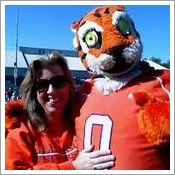A fifth-grade Gifted and Talented mathematics teacher gives her views on continuing education, and how it not only benefits the students, but the teachers themselves.
Thinking back on your childhood teachers, which ones stand out to you?
Is it the teacher who read off power point presentations, droning on about different bullet points and sounding like they may as well be reading from a script? Or is it the dynamic, responsive teacher who pulled from experience, admitted to mistakes, and learned alongside you and your fellow students?
Fifth-grade teacher Kathy Ladd understands that effective teachers must constantly learn and adjust to meet the learning needs of their individual students. It isn’t simply reading from a book and assigning students homework – it’s an interactive process where teacher and learner are sometimes the same. It’s this philosophy on education that led Ladd to return to school to earn her master’s degree.
“To me, your master’s makes you challenge yourself, which reciprocates in your classroom,” Ladd said. “If we’re going to challenge the kids to be thinkers, we have to know how to be out-of-the-box thinkers ourselves.”
Ladd believes that master’s degrees are critical for teachers to stay on top of new advancements in educational theory and implementation. It’s just what being a life-long learner as a teacher is about.
“In education, you constantly have to be willing to advance yourself, and in order to keep up with society’s changing needs, that’s the only way to do it: through advancing your degree,” Ladd said. “With the master’s programs, that’s the purpose of them – to teach teachers how to be higher order thinkers and develop objectives within the standards that enhance students’ abilities to become thinkers.”
Ladd, who earned her bachelor’s degree in elementary education in 1989, decided to enter a master’s program in 2008 to gain a better understanding of new research and implementation of teaching philosophy and technology. Ladd says it was interesting reviewing some of the “founding fathers” of educational philosophy, and how those theories have been put into place with new laws like No Child Left Behind.
While reviewing the philosophical background of education was helpful to Ladd, she believes the most beneficial aspect of her program was exploring learning patterns.
“Master’s classes teach you about learning styles a lot more than undergraduate,” Ladd said. “Undergraduate kind of hints on it, but learning styles are really important. Education is really big on ‘buzz words,’ but I really believe in knowing what type of learner you have and what kind of learner you are.”
Who are Gifted and Talented children?
Gifted and Talented children have several characteristics that set them apart from their classmates. The National Society for the Gifted and Talented lists the following as just some of these features:
- May sometimes be perfectionists or highly idealistic
- May have higher expectations of themselves and others
- May know half a year’s curriculum before the year even begins
- They are natural problem solvers
- Often think abstractly, and may need help developing more concrete study and test-taking skills
- Perfectionism may lead to interpretation that anything less than an “A” is failure
Source: National Society for the Gifted and Talented
As a teacher of Gifted and Talented students, Ladd was particularly interested in how she could adjust her teaching strategies to meet the needs of her higher-level students.
Gifted and Talented students are recognized as having exceptional academic capacity. These students are placed in upper-level classrooms where educators present more advanced concepts and course material. In Ladd’s fifth grade gifted and talented classroom, she must constantly stay on her toes to meet the learning styles of her advanced students.
“Over the years, I’ve taught kids who know more than I know on a specific topic, and there’s no way you can know everything,” Ladd said. “You’ve got to be willing to be proved wrong by your students at times, and be willing to learn yourself within the gifted classroom.”
Ladd says teachers are more comfortable teaching in the particular way they learn. Her master’s program gave her the ability to exit that comfort zone, and try new approaches to teaching her gifted and talented students.
“If you’re an effective teacher and really good at what you do, you have to find ways to address the needs of those students who maybe don’t fit your learning style, and address your teaching style to meet their needs,” she said.
Ladd is a “global thinker,” meaning she likes to see things as a big picture. While teaching, Ladd is careful to not only provide global-minded teaching to students, but also be more specific and narrow with students she says are analytical thinkers. Ladd thinks her master’s program greatly attributed to her ability to be more alert about her students’ individual learning patterns, as well as her own.
Ladd’s advanced knowledge of education has paid off both for her and her students. While many teachers go on to earn master’s degrees to earn higher pay, Ladd believes watching her students build confidence in their abilities and succeeding is “the best paycheck you can get.”
Ladd’s classes have been highly successful thanks to her attitude as a teacher and advanced training. Ladd estimates that after leaving her fifth grade math class, 80% of her students are placed in seventh and eighth grade math courses.
“I just love what I do,” Ladd said. “Kids are the best, and when you see them happy and being able to develop a love of learning, I mean, that’s basically what we should be doing as educators.”



